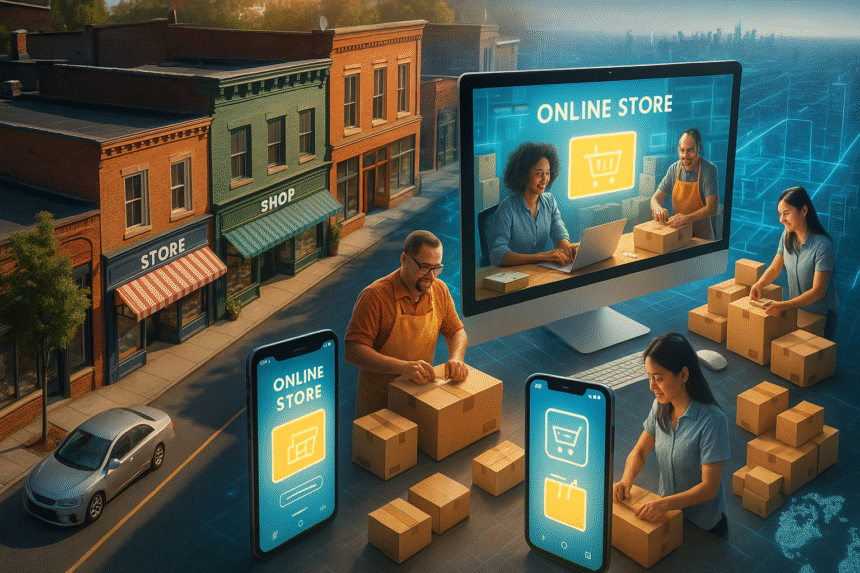In today’s hyper-connected world, the survival of small businesses depends on their ability to adapt to the digital marketplace. Traditional storefronts still have value, but they can no longer compete solely within their local boundaries. E-commerce has transformed consumer behavior, making it possible for buyers to shop anywhere, anytime, and from any device.
While some business owners still believe their loyal local customers are enough to sustain growth, the reality tells a different story: without e-commerce, small businesses risk losing relevance, market share, and long-term viability.
Now, we will explore the real reason e-commerce is essential for small businesses, the benefits it offers, and the strategic steps needed to thrive online.
Why E-Commerce Is a Survival Imperative for Small Businesses
1. Changing Consumer Behavior
Shoppers now expect convenience, speed, and variety. Over 70% of consumers begin their product search online, even if they plan to buy in-store later. This means that without an online presence, small businesses lose a massive portion of potential customers before they even walk through the door.
2. Competitive Pressure
Big-box retailers and online giants like Amazon have raised the bar for convenience and speed. Small businesses that fail to compete on these fronts risk being left behind.
3. Global Access
E-commerce eliminates geographical barriers. A local bakery can sell unique gourmet cookies to customers across the country. Without it, small businesses limit themselves to a smaller pool of potential buyers.
Benefits of E-Commerce for Small Businesses
| Benefit | Description | Impact on Small Businesses |
| Expanded Market Reach | Sell beyond your local area. | More customers, more revenue. |
| Lower Operational Costs | No need for large physical spaces. | Higher profit margins. |
| 24/7 Sales | Online stores are always open. | Increased sales opportunities. |
| Customer Insights | Data analytics reveal buying habits. | Better marketing decisions. |
| Scalability | Easily add products and expand. | Sustainable growth. |
Common Challenges Small Businesses Face Without E-Commerce
| Challenge | Consequence |
| Limited customer base | Revenue stagnation or decline |
| Higher overhead costs | Lower profit margins |
| Reduced visibility | Fewer new customers |
| Vulnerability to economic shifts | Increased business risk |
| Competitive disadvantage | Loss of market share |
The Core Reason Small Businesses Can’t Survive Without E-Commerce
The single most important reason is visibility.
Without e-commerce, small businesses operate in a vacuum, relying on foot traffic, word-of-mouth, and limited advertising. Meanwhile, customers are increasingly using search engines and social media to find products and services. If you’re not online, you don’t exist in the modern consumer’s world.

How Small Businesses Can Successfully Transition to E-Commerce
Step 1: Build a User-Friendly Website
Your website is your online storefront. Make it:
- Mobile-friendly (over 60% of online shopping is on mobile devices)
- Fast-loading
- Easy to navigate
Step 2: Use SEO to Increase Visibility
SEO helps small businesses appear in search results.
Focus on:
- Keyword research
- Optimized product descriptions
- Local SEO strategies
Step 3: Leverage Social Media
Social platforms like Instagram, TikTok, and Facebook are powerful tools for driving traffic to your e-commerce store.
Step 4: Offer Multiple Payment Options
From credit cards to PayPal and digital wallets, making payments easy boosts conversions.
Step 5: Provide Excellent Customer Service
Online reviews influence buying decisions. Positive interactions encourage repeat business.
How Confe.io Empowers Small Businesses to Succeed Online
For many small businesses, the leap from brick-and-mortar to e-commerce can feel overwhelming — from setting up an online store to optimizing it for conversions. That’s where Confe.io steps in.
Confe.io provides all-in-one solutions for small business owners looking to establish a professional online presence without the high costs of traditional web development. Their platform offers:
- User-friendly website building tools that require no coding skills.
- Integrated e-commerce features like payment gateways, product management, and shipping options.
- Built-in SEO optimization so your store can rank on Google and attract organic traffic.
- Mobile-first designs to cater to today’s mobile shoppers.
By leveraging Confe.io, small businesses can cut down setup time, reduce overhead, and compete with larger retailers in the digital marketplace. For many, this can be the difference between struggling locally and thriving globally.
Digital Marketing Strategies for Small Businesses in E-Commerce
| Strategy | Benefit |
| Content Marketing | Builds trust and authority |
| Email Campaigns | Increases repeat sales |
| Influencer Partnerships | Expands brand reach |
| Paid Ads | Quick traffic and conversions |
| Retargeting Campaigns | Recaptures lost visitors |
Overcoming the Fear of Going Digital
Many small businesses hesitate to invest in e-commerce due to:
- Budget concerns
- Technical challenges
- Uncertainty about ROI
The truth is, the cost of not going online is far greater. Affordable tools like Shopify, WooCommerce, and Wix make launching an online store simple and cost-effective.
Actionable Insights for Small Businesses Entering E-Commerce
- Start Small – List your top-selling products online first.
- Use Analytics – Monitor sales, customer behavior, and traffic sources.
- Test and Optimize – Adjust product pages, pricing, and promotions based on data.
- Focus on Customer Experience – Make every interaction smooth and memorable.
5 FAQs About Small Businesses and E-Commerce
Q1: Is e-commerce expensive for small businesses?
A: Not necessarily. Many platforms offer affordable plans starting at under $30 per month.
Q2: Can small businesses still succeed without e-commerce?
A: In the long term, it’s unlikely due to shifting consumer habits.
Q3: What’s the first step in launching e-commerce?
A: Building a functional, mobile-friendly website.
Q4: How long before small businesses see results from e-commerce?
A: Many see improvements in 3-6 months with consistent marketing.
Q5: Is social media enough without an online store?
A: Social media helps, but a dedicated e-commerce site builds credibility and control.
Conclusion
E-commerce is not just a trend—it’s the new foundation for small businesses. From expanding market reach to providing valuable customer insights, an online presence can mean the difference between thriving and closing your doors. The real reason small businesses can’t survive without e-commerce comes down to visibility, accessibility, and adaptability. Those who embrace the shift early will not only survive but lead in their industries.












